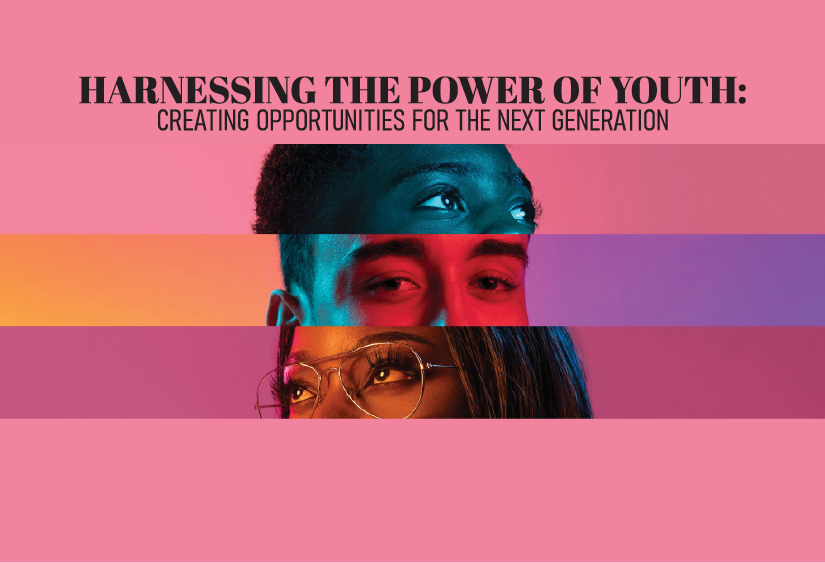
Article by
Pakistan is at a pivotal moment with a median age of around 22 years, positioning it as one of the youngest countries globally. This youth bulge offers a remarkable opportunity alongside significant challenges. With more than 64% of the population under 30, the nation has the potential to leverage this demographic dividend to drive economic growth, social development, and innovation. However, if these opportunities are not effectively addressed, the same youth population could contribute to rising unemployment, social unrest, and economic stagnation. To avoid this bleak scenario, it is imperative that Pakistan creates and sustains opportunities for its youth, fostering an environment where young people can thrive and contribute meaningfully to society.’
Currently, the youth in Pakistan face multifaceted challenges. Unemployment and underemployment are rampant. According to the Labour Force Survey, 4.51 million are jobless with an unemployment rate of 6.3 percent. This figure is even higher among young women, reflecting deep-seated gender disparities. Additionally, the quality of education remains a significant concern. While Pakistan boasts a literacy rate of about 62.8%, the reality is that many young people, even those with degrees, lack the skills required by the modern job market. This skills mismatch is a critical barrier to employment and economic mobility.
The digital divide further compounds these issues. In an era where digital literacy and access to technology are crucial, a large proportion of Pakistani youth remain disconnected. Only about 25% of the population has access to the internet, which severely limits opportunities for education, entrepreneurship, and employment. Bridging this digital gap is essential for ensuring that young Pakistanis can compete in a globalized world.
Despite these challenges, the resilience and potential of Pakistan’s youth are undeniable. Young Pakistanis have demonstrated remarkable ingenuity and creativity in various fields, from technology and entrepreneurship to arts and social activism. For instance, Pakistani startups have begun to make their mark on the global stage, with companies like Airlift and Bykea showcasing the innovative spirit of the nation’s youth. Moreover, social movements led by young people, such as climate change, advocacy, and women’s rights campaigns, have gained international recognition, highlighting the leadership capabilities within this demographic.
To harness this potential, Pakistan must adopt a multifaceted approach that addresses education, employment, and empowerment. Firstly, the education system requires a comprehensive overhaul. It is not enough to increase enrollment rates; the focus must shift to improving the quality of education. This includes updating curricula to meet the demands of the 21st century, investing in teacher training, and integrating technology into the classroom. Vocational training and STEM (Science, Technology, Engineering, and Mathematics) education should be prioritized to equip young people with relevant skills.
Furthermore, creating economic opportunities for the youth is crucial. This can be achieved through fostering entrepreneurship and supporting small and medium-sized enterprises (SMEs), which are the backbone of any economy. The government, along with private sector partners, should establish incubators and accelerators that provide young entrepreneurs with access to capital, mentorship, and markets. Additionally, public-private partnerships can play a significant role in creating job opportunities and apprenticeships, ensuring that young people gain practical experiences and are better prepared for the workforce.
Digital inclusion is another critical area that requires urgent attention. Expanding internet access and improving digital literacy should be national priorities. Initiatives such as subsidizing internet costs for low-income families, establishing community internet centers, and incorporating digital skills training into the education system can help bridge the digital divide. By doing so, Pakistan can unlock new opportunities for education, employment, and innovation for its youth.
Empowerment of young people also necessitates creating an enabling environment where their voices are heard, and their contributions are valued. This involves promoting youth participation in decision-making processes at all levels, from local to national government. Establishing youth councils and forums can provide platforms for young people to express their views and influence policies that affect their lives. Additionally, efforts to promote gender equality and inclusivity are essential to ensure that all young people, regardless of their background, have the opportunity to succeed.
The role of the international community should not be overlooked. Development partners and international organizations can support Pakistan’s efforts by providing technical assistance, funding, and best practice models. Collaborative initiatives that facilitate knowledge exchange and capacity building can enhance the effectiveness of youth-focused programs and policies.
Pakistan's youth can transform the nation's socio-economic landscape through education, economic opportunities, and digital inclusion. A united effort from the government, private sector, and civil society is essential. Immediate action is vital for the success and well-being of future generations.
 Monthly "Azeem English Magazine", launched in 2000, records the information about diverse fields like mental health, literature, research, science, and art. The magazine's objective is to impart social, cultural, and literary values to society.
Monthly "Azeem English Magazine", launched in 2000, records the information about diverse fields like mental health, literature, research, science, and art. The magazine's objective is to impart social, cultural, and literary values to society.
+92 51 88 93 092
First Floor, RAS Arcade, Eidhi Market, Street#124, G-13/4, Islamabad, Pakistan, 44000.